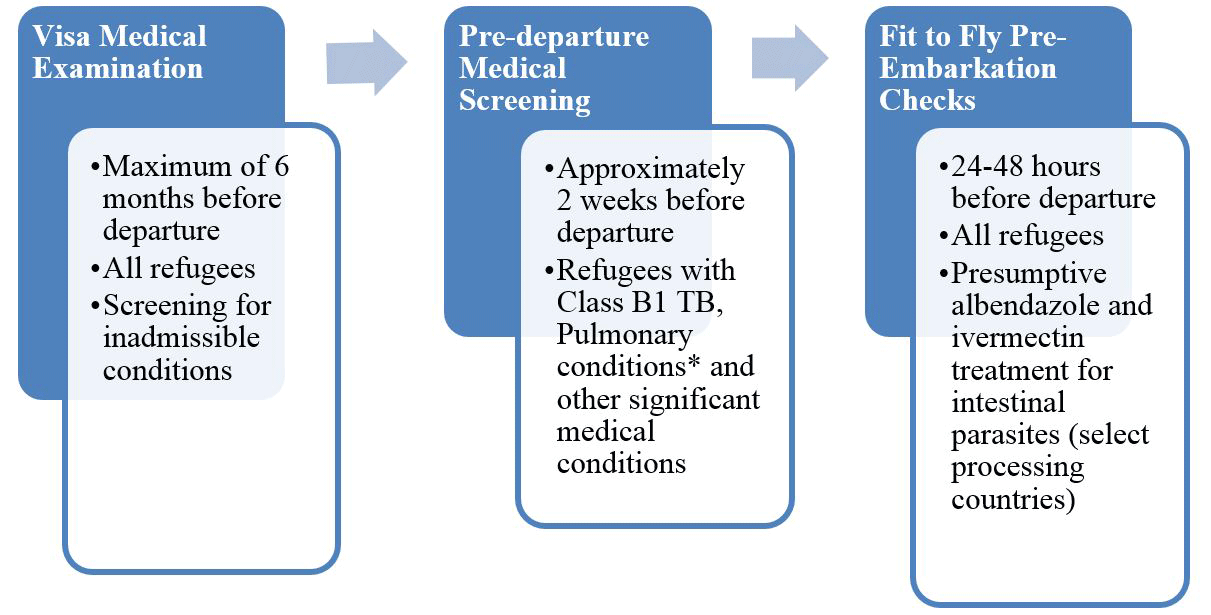Medical Screening of U.S.-Bound Refugees
Syrian Refugee Health Profile
Syrian refugees who have been identified for resettlement to the United States receive a required medical examination. Depending on the country of processing, refugees may receive additional pre-departure and pre-embarkation checks (Figure 4). As outlined below, the full required medical examination occurs 3-6 months prior to departure; the pre-departure medical screening and pre-embarkation checks, if conducted, occur close to or immediately before departure for the United States.
Figure 4: Medical assessment of U.S.-bound refugees

* “Class B1 TB, Pulmonary” refers to an admissible medical condition in which there is an abnormal screening chest X-ray but negative sputum TB smears and cultures or to TB diagnosed by the panel physician and fully treated by directly observed therapy.
Visa Medical Examination
A visa medical examination is mandatory for all refugees coming to the United States and must be performed according to the CDC’s Technical Instructions. The purpose of this medical examination is to identify applicants with inadmissible health-related conditions. These include, but are not limited to, mental health disorders with harmful behavior, substance abuse, and specific sexually transmitted infections (untreated). Active tuberculosis (TB) disease (untreated or incompletely treated) is an inadmissible condition of great concern due to its infectious potential and public health implications. Technical Instructions for Tuberculosis Screening and Treatment are available on CDC’s website.
The required medical examinations for refugees processed in Jordan, Iraq, and Egypt are conducted by physicians from the International Organization for Migration (IOM). In other countries, including Lebanon, Turkey, and Austria, examinations are performed by local panel physicians appointed by the U.S. Embassy. CDC provides the technical oversight and training for all panel physicians. All panel physicians, regardless of affiliation, are required to follow the same Technical Instructions developed by CDC.
Information collected during the refugee visa medical examination is reported to CDC’s Electronic Disease Notification System (EDN) and is sent to U.S. state health departments where the refugees are resettled.
Pre-Departure Medical Screening (PDMS)
Depending on the country of processing, pre-departure medical screening is conducted approximately 2 weeks before departure for the United States for refugees previously diagnosed with a Class B1 TB, pulmonary condition (abnormal chest X-ray with negative sputum TB smears and cultures, or pulmonary TB diagnosed by panel physician and fully treated by directly observed therapy). The screening includes a medical history and repeat physical exam. This screening primarily focuses on tuberculosis signs and symptoms, and includes a chest X-ray, and sputum collection for sputum TB smears (if required). Depending on the country of processing, refugees with other chronic or complex medical conditions may receive a cursory medical screening prior to departure in order to assess a refugee’s fitness for travel. However, this exam is not routinely conducted by panel physicians and is not required.
Pre-Embarkation Checks (PEC)
Depending on the country of processing, IOM physicians perform a pre-embarkation check within 24-48 hours of the refugee’s departure for the United States to assess fitness for travel and to administer presumptive therapy for intestinal parasites.
CDC is working with IOM and independent panel physicians in the Middle East to expand PDMS/PEC throughout the region.
Vaccination Program for U.S.-bound Refugees
In addition to vaccines received through national immunization programs and/or administered by NGOs, Syrian refugees may receive select vaccines as part of the Vaccination Program for U.S.-bound Refugees. Whether or not a Syrian refugee receives vaccines prior to departure depends on the country of processing, vaccine availability, and other factors. Refugees in Iraq and Jordan may receive bivalent oral polio (bOPV), MMR, and pentavalent (DTP-Hepatitis B-Hib) vaccines, depending on age. Hepatitis B surface antigen testing will be conducted for refugees receiving hepatitis B vaccine once testing kits are available.
All vaccines administered through the Vaccination Program for U.S.-bound Refugees, as well as records of historical/prior vaccines provided by NGOs and national programs, will be documented on the DS-3025 (Vaccination Documentation Worksheet) form. U.S. providers are strongly encouraged to review each refugee’s records to determine which vaccines were administered overseas.
In the next few years, CDC, in partnership with the U.S. Department of State’s Bureau for Populations, Refugees, and Migration (PRM), hopes to implement this vaccination program among all U.S.-bound refugees in the Middle East. Additional information about the CDC-PRM Vaccination Program for U.S.-bound Refugees is available on CDC’s Immigrant, Refugee, and Migrant Health website.
Presumptive Therapies for Intestinal Parasites
Syrian refugees departing from Jordan, Iraq, and Egypt may receive albendazole for soil-transmitted helminthic infection, and ivermectin for strongyloidiasis. Refugees departing from Jordan and Egypt receive presumptive treatment via directly observed therapy (DOT) at PEC. Syrians departing from Iraq may receive a single dose of albendazole and ivermectin, and due to security and logistical challenges, may be given a second dose of ivermectin to self-administer. At this time, Syrian refugees departing from Turkey, Lebanon, and Austria do not receive any presumptive parasitic treatment.
U.S. providers should refer to each refugee’s PDMS form to determine which interventions, including vaccinations and presumptive therapy for intestinal parasites, were administered overseas.
Additional information regarding presumptive therapy for intestinal parasites can be found here.
Post-Arrival Medical Screening
CDC recommends that refugees receive a post-arrival medical screening (domestic medical screening) within 30 days after arrival in the United States. The U.S. Department of Health and Human Services Office of Refugee Resettlement (ORR) reimburses providers for screenings conducted during the first 90 days after the refugee’s arrival.
The purpose of these more comprehensive examinations is to assess for health conditions and to introduce newly arrived refugees to the American healthcare system. CDC provides guidelines and recommendations for this medical screening, while state refugee health programs oversee its implementation. The screening is conducted by state refugee health programs or private physicians designated by these programs. Most state refugee health programs then collect data from this screening.
- Page last reviewed: January 10, 2017
- Page last updated: January 10, 2017
- Content source:


 ShareCompartir
ShareCompartir